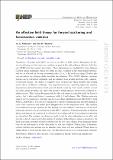An effective field theory for forward scattering and factorization violation
Author(s)
Rothstein, Ira Z.; Stewart, Iain W
Download13130_2016_Article_4436.pdf (4.093Mb)
PUBLISHER_CC
Publisher with Creative Commons License
Creative Commons Attribution
Terms of use
Metadata
Show full item recordAbstract
Starting with QCD, we derive an effective field theory description for forward scattering and factorization violation as part of the soft-collinear effective field theory (SCET) for high energy scattering. These phenomena are mediated by long distance Glauber gluon exchanges, which are static in time, localized in the longitudinal distance, and act as a kernel for forward scattering where |t| ≪ s. In hard scattering, Glauber gluons can induce corrections which invalidate factorization. With SCET, Glauber exchange graphs can be calculated explicitly, and are distinct from graphs involving soft, collinear, or ultrasoft gluons. We derive a complete basis of operators which describe the leading power effects of Glauber exchange. Key ingredients include regulating light-cone rapidity singularities and subtractions which prevent double counting. Our results include a novel all orders gauge invariant pure glue soft operator which appears between two collinear rapidity sectors. The 1-gluon Feynman rule for the soft operator coincides with the Lipatov vertex, but it also contributes to emissions with ≥ 2 soft gluons. Our Glauber operator basis is derived using tree level and one-loop matching calculations from full QCD to both SCET[subscript II] and SCET[subscript I]. The one-loop amplitude’s rapidity renormalization involves mixing of color octet operators and yields gluon Reggeization at the amplitude level. The rapidity renormalization group equation for the leading soft and collinear functions in the forward scattering cross section are each given by the BFKL equation. Various properties of Glauber gluon exchange in the context of both forward scattering and hard scattering factorization are described. For example, we derive an explicit rule for when eikonalization is valid, and provide a direct connection to the picture of multiple Wilson lines crossing a shockwave. In hard scattering operators Glauber subtractions for soft and collinear loop diagrams ensure that we are not sensitive to the directions for soft and collinear Wilson lines. Conversely, certain Glauber interactions can be absorbed into these soft and collinear Wilson lines by taking them to be in specific directions. We also discuss criteria for factorization violation.
Date issued
2016-08Department
Massachusetts Institute of Technology. Center for Theoretical Physics; Massachusetts Institute of Technology. Department of PhysicsJournal
Journal of High Energy Physics
Publisher
Springer Berlin Heidelberg
Citation
Rothstein, Ira Z., and Iain W. Stewart. “An Effective Field Theory for Forward Scattering and Factorization Violation.” Journal of High Energy Physics 2016.8 (2016): n. pag.
Version: Final published version
ISSN
1029-8479